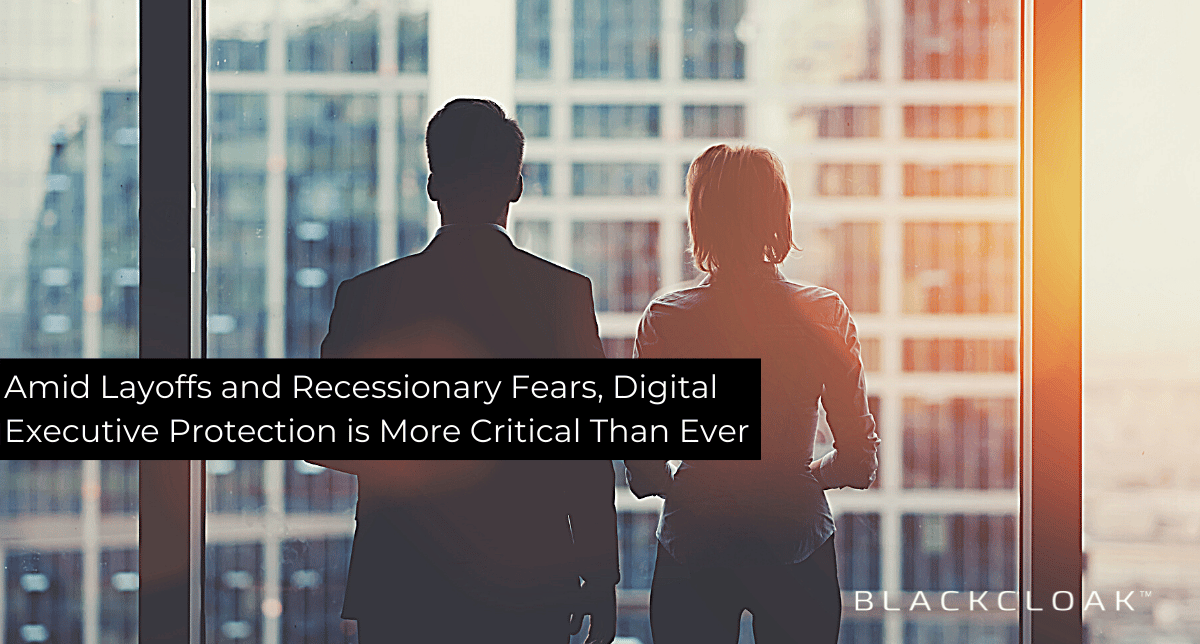Amid Layoffs and Recessionary Fears, Digital Executive Protection is More Critical Than Ever

The U.S economy is in uncharted territory. Unemployment remains at historic lows, the labor market is strong, yet wages are stagnant, and inflation is peaking at record highs.
Businesses are unsure how to respond. Some are trekking forward, while others are in limbo or, due to fears of a recession, are pulling back. And, sadly, others are using economic uncertainty to lay off employees when they may or may not need to.
In June 2022, job cuts surged, up 57% from May and 59% year-over-year. Companies that slashed jobs included Netflix, Oracle, Microsoft, Re/Max, and JPMorgan.
Whatever the case may be and no matter how these severances are handled – warranted or not – the reputation of a company is in peril any time layoffs occur. Angry employees will take to social media, to sites like Glassdoor, and in any public forum possible to vent their frustration. Can you blame them?
Unfortunately, during these times, certain individuals will take things too far and threaten both the digital and physical security of a company, its leaders, and its data.
Protect your executives, protect your company
As we await the actual fallout from this post-COVID economy, corporate security teams should strongly consider investing in digital executive protection to shield their people and their digital assets from former-employee backlash.
In particular, digital executive protection can help companies and their leaders avoid the following digital threats:
1. Doxing
Doxing is the act of revealing someone’s home address, email, or phone number and can result in harassment, abuse, and even physical harm. Sharing someone’s Social Security number can also expose executives to hacking and identity theft.
Doxing can be perpetrated by disgruntled former employees. They can glean information through several methods, including web and social media searches, data broker sites, and by obtaining information on the dark web.
BlackCloak protects executives in part by scrubbing their personal information from internet data brokers, hardening the privacy settings on all devices and apps, and scanning the dark web for leaked personal information.
2. Social media hijacking
Disgruntled employees can also impersonate or spoof an executive’s social media accounts and cause trouble. Typical tactics to gain access include phishing and exploiting weak passwords, stolen credentials (seven in 10 of which are freely available on the dark web), and compromising apps that lack multi-factor authentication (MFA). From here, a bad actor can mimic the executive, bad mouth the company, and drag its reputation into the gutter.
BlackCloak protects executive’s social media accounts by hardening privacy settings and removing credentials from the dark web that could be exploited. We help our client’s setup MFA so that if an executive’s credentials are obtained, attackers are blocked from accessing their personal accounts and doing anything that could impact the executive or the company.
3. Physical harassment
Physical threats against executives are on the rise. It’s not uncommon for corporate executives to be confronted, assaulted, and even fatally harmed by former employees. In the past year, 24% of executives and their families have received threats or were harmed in their homes or while traveling.
In the era of digital nativism, an executive’s digital footprint can create physical risk. As corporate leaders conduct business over home or public Wi-Fi networks, they become a lucrative target for threat actors seeking access to sensitive information about them and their family members, where they live, and what their travel plans are.
Companies spend millions of dollars to protect executives – both physically and across the corporate digital landscape – but they won’t really be safe unless their personal digital lives are protected, too. That’s what the BlackCloak platform does. It places a cloak of protection over an executive’s personal digital footprint – at home, across devices, and on the go. And, should a threat event occur, our cybersecurity experts are never more than a call or click away – 24x7x365.
4. Intentional leakage of confidential information
Disgruntled former employees can also target executives to target the company and leak confidential information that is not made for public consumption.
How? Too often, executives use the same passwords for their personal life as they do in the corporate world. Furthermore, seven in ten write down their passwords on sticky notes or store them in their contacts list on the phone. Bad actors can use these credentials to access other services, such as an executive’s email or other applications, and leak confidential information or gain access to corporate networks and systems – further amplifying risk. Moreover, embarrassing information about that executive could be leaked – casting a bad light on the company.
When onboarding our own clients, we found that 75% of the personal devices used by executives are leaking data due to improper privacy settings, 87% of personal cell phones and tablets lack security software, and a whopping 39% of personal devices are already compromised with malware.
BlackCloak protects against this scenario by ensuring that an executive’s home network and every device connected to it are secure – including laptops, tablets, IoT, and security cameras – and that confidential corporate information is kept out of the wrong hands.
Protect your executives, and respect your employees
By protecting an executive’s privacy, devices, and networks, we proactively reduce the risk of them falling victim to cybercrime, cyberstalking, and cyberbullying; as well as online and in-person harassment, extortion, impersonations, and threats to physical safety.
Digital executive protection can’t prevent all negative incidents arising from an executive’s affiliation with an employer, but it can substantially reduce risk across their personal digital footprint and rein in the potential damage.
And while we can help, the best thing you can do is treat your people with respect and empathy, especially if you must lay them off, whatever the reason may be. Doing so is ultimately what might reduce your risk the most.









